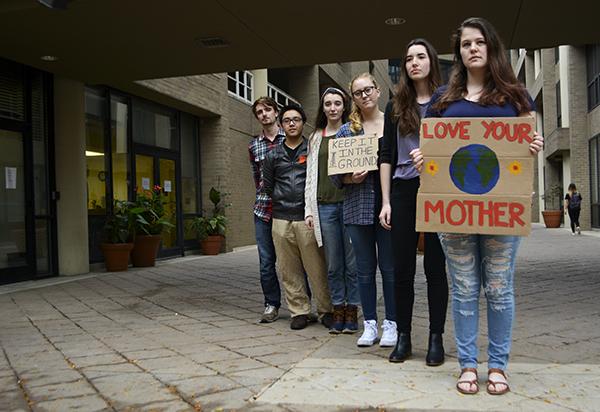After a years-long lobby, one student group is trying a new strategy to convince the University to give up its investments in fossil fuels.
Fossil Free GW hopes that a new advisory board made up of students and faculty could help University officials better understand what people on campus are saying about the divestment movement – a concept some students say is sometimes lost in translation.
Members of Fossil Free GW have been rallying for two years to persuade the University’s Board of Trustees to remove the University’s investments in companies supporting fossil fuel production, and to invest in more sustainable sources of energy. Students nationwide have been making the same push, most recently at Georgetown and Stanford universities, saying that investments in fossil fuels can mean that institutions support polluting the Earth.
Frank Fritz, an organizer of Fossil Free GW, helped write a list of nine proposals this fall for the Board of Trustees to consider if they choose to vote to divest from the fossil fuel industry. He said he already has support from both students and faculty to create the committee.
“We think it’s important that students have a say so that they can lodge their concerns in a more formalized manner because there’s no real way to address this [issue],” Fritz said.
He said student groups like GW NAACP and the Roosevelt Institute have shown interest in volunteering some members to the advisory board, and some of the nine proposals will be “co-authored” with other student organizations.
He added that the advisory board hasn’t been formed yet, but he’s been working with student groups and faculty to develop the committee. He declined to name faculty who have shown interest in the advisory board.
Last year, a student referendum which encouraged the University to divest from fossil fuels passed by about 72 percent.
The University has made sustainability a top priority since the start of University President Steven Knapp’s administration. The University has cut its greenhouse emissions by 7 percent since 2010 as part of its larger effort to reduce greenhouse emissions by 40 percent before 2025 and by 80 percent before 2040.
Georgetown University, one of GW’s peer institutions, also has a committee of students and faculty in place to allow more student involvement in the university’s decision-making on sustainability issues.
But some say the committee might not be the most effective way to get the University to turn away from fossil fuels because it’s an industry that can generate a large amount of revenue. A report published in September found that divesting from fossil fuels could hurt a university’s endowment.
John Jurewitz, a sustainable finance expert and economics professor at Pomona College, said the Board of Trustees might not be inclined to listen to a committee of students and faculty.
“I think it’s going to be difficult for a committee to get a positive result out of a Board of Trustees, but that doesn’t mean that it’s not worth pursuing,” he said.
He said a better use of the group’s time might be to encourage the Board to get involved with the sustainability efforts on campus.
“I think there’s more constructive things that can be done in terms of getting the Board of Trustees to support sustainability programs on campus, and maybe even join the community’s sustainability programs that would reduce the carbon footprint of the college,” Jurewitz said.
Ryan Lasker contributed reporting.








